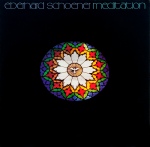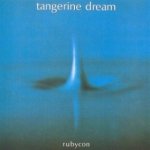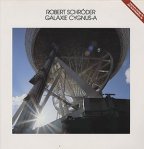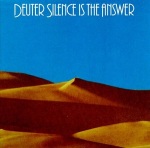Continuing my fascination with Germanic experimental music and expanding on the theme of my first Krautrock post, here’s a selection of both better- and lesser-known electronic albums from the seventies through the early eighties. Not all of them are purely electronic, but experimentation with electronic instruments and textures played an important role in the creation of each of these works.
Honestly, these folks put Anglos to shame with their genius!
Also, listen to my official mix of tracks from these and other albums!
This album is a great example of a collaboration playing to the strengths of all the participants, leading to a unique creation. The playfully weird style Cluster is known for is combined with Brian Eno’s more reflective sonic genius in a collection of little sonic gems. However, the feel is pure German, right from the start of the hypnotic first track, “Ho Renomo“. The use of phasing on “Schöne Hände” is also quite astounding. There’s also some delightful piano, a couple of Kraut/prog instrumentals and a piece that sounds like avant garde Indian classical music to boot. You really can’t be a true electronic music or Krautrock fan if you don’t have and appreciate this album.
I suppose in a way this is cheating, because before Moogs and ARPs and sequencing really got under way, it’s debatable just how “electronic” in the modern sense Schulze’s and Tangerine Dream’s music really was — there was a lot of messing about with organs and reverb. Nonetheless, this is a landmark double album that bridges the territory between avant garde and what would develop into ambient music. And it’s quite the album, a cold, almost harsh metallic landscape of moody organ drones and spooky noises, with each piece breaking the 20-minute barrier and then some. So maybe not for those who want birdies chirping by mountain streams and nice things like that. A very dark, bleak experience, but as an exercise in claustrophobic melancholy, it can’t be beat. If you are a Krauthead but have not heard this, you must — it’s much different to his work from Timewind and on.
 Eberhard Schoener – Meditation (1973)
Eberhard Schoener – Meditation (1973)
Schoener too also went on to more new agey electronica (including some kind of collaboration with Sting, apparently), but on this album he’s kind of early Schulze part B. Which is not to imply that this album is a lesser beast or lacks its own cold, unearthly personality. In fact, it’s one of my favourite German experimental albums. Meditation is two lengthy tracks of organ drones and pulses, underwater submarine-like sounds, rustling, screeching and anything else odd and disquieting that Schoener could produce. Is this trancelike? Is the Pope reputed to be a Catholic? This is not light music, but I can attest that it is actually good for meditation! The second track will definitely appeal to fans of T-Dream’s Atem and Zeit, which is high praise indeed.
Harmonia, like Cluster (whose members were also in this group — it’s sort of an extended Cluster), did not make a particular kind of electronic music — basically whatever struck their fancy. But there’s a delightfully poppy nature to a lot of their compositions that makes their output closer to Kraftwerk than anything else. So this, their most accessible album, starts with the light-hearted and fun title track then segues into the trancelike and lengthy “Walky Talky” and the pounding cosmic rock of the Neu!-like “Monza“. Also worth pointing out are the wonderful contributions of guitarist Michael Rother of Neu! fame — a cosmic axe voyager deserving of mention with the exalted likes of Göttsching and Hillage.
 Tangerine Dream – Rubycon (1975)
Tangerine Dream – Rubycon (1975)
The biggest name in German electronic music! This is T-Dream’s first album after the very popular Phaedra. To the group’s credit, instead of crafting shorter songs for UK radio play, they instead put out this leviathan that probably wore out on the turntables of many Floyd fans. The last time T-Dream were ever really this spooky, this album features two side-long title tracks that utilize sequencers, but also hearken back to the group’s delightfully crazy early work. The combination of synths and other electronics with choir mellotron that sounds like Ligeti’s finest is an incredible blend. The final minutes of part II, with flute ‘tron and floating synthesizers, is as peaceful a time as you will ever spend with music. A landmark album and probably one of the five best albums in T-Dream’s massive discography.
“Faan faan faan of ze autobahn“! Meaning fun, of course. But apparently it just sounds like English and they’re saying “fahren”. Too bad. The 23-minute track that helped make Kraftwerk’s Düsseldorf stylings an alternate universe pop sensation is indeed here, setting the template for “motorik” robot sounds. These “musik arbeiter” are devoted to their chugging, pulsing grooves, creating a most palpable trancelike effect that’s really a take-it-or-leave-it proposition. I mostly take it. The second side of shorter pieces is in the style of earlier Kraftwerk, not so reliant on beats, though “Komentenmelodie 2” is certainly a lot of light-hearted fun. The unexpected avant garde electronica of “Mitternacht” is a nice bonus. The final track, “Morgenspaziergang”, with a recorder part, sounds like Deuter! This album kind of contains the best of both sides of Kraftwerk, the later drum-machine robot pop and the freewheeling experimentation of earlier works.
 Adelbert Von Deyen – Nordborg (1979)
Adelbert Von Deyen – Nordborg (1979)
I’m sure synthesists with recording aspirations were a dime a dozen back in those days as Germans became known for that kind of music, and I’m sure most of them were pretty derivative. However, there are always gems to be unearthed, and Von Deyen put out quite a few good ones, each graced with pleasantly bizarre cover art. Nordborg is the best, a two-track album presumably meant to evoke polar atmospheres. “Moonrise” will appeal greatly to Schulze fans, while “Iceland” fuses that sort of style with a repetitive drum machine beat similar to Neu! or Kraftwerk, creating a hypnotic effect. There’s a ton of good ol’ “string synth”, a late-70s standby that never fails to please me. Maybe not the first German electronic album you’d want, but if you get into it, you’ll end up here if you develop a taste for it.
 Robert Schröder – Galaxy Cygnus A (1982)
Robert Schröder – Galaxy Cygnus A (1982)
Schröder, who worked with a number of artists, including Schulze, inventing new sounds and devices, put out a steady stream of albums throughout the eighties, and this is the best. It’s a fusion of pure Berlin School stylings with the latest in synths, and apparently featuring white noise recorded from the galaxy in question. This heavily sequenced, elegant album may have been released in 1982 but sounds very 1977. There’s some interesting percussive sounds, some great choir-synths (not ‘tron, I assume), and some more experimental, avant garde passages as well. Basically it sounds like a Tangerine Dream album. Which is great! If you like this kind of thing, seek it out for sure.
 Deuter – Silence is the Answer (1981)
Deuter – Silence is the Answer (1981)
Deuter is actually best-known as a “new age” artist who makes cuter music than this (though I do quite like it) for the purposes of Buddhist meditation and Reiki and suchlike. But his early albums are fine artefacts of the age of questing electronic experimentation. He’s kind of a mix of Tangerine Dream, Popol Vuh and the acoustic stylings of Stephan Micus, another favourite of mine. So while this is still some lighter fare, definitely new agey in tone, there are some really lovely moments to be enjoyed, such as the spacey “Silence is the Answer” suite with its combination of acoustic instruments (including gamelan-like bells) and synth drones. The ultra-tranquil “Divine Dust” is another highlight. If you are very cynical in your listening choices, you might not like it, but if you love vintage synths and world music, this is your bag!
 Manuel Göttsching – Inventions for Electric Guitar (1975)
Manuel Göttsching – Inventions for Electric Guitar (1975)
There’s much more than guitar on this album by the Ash Ra Tempel guitarist whose E2-E4 has been so influential on modern electronic music. Personally, I can only get through about ten minutes of that — this release is much more my style. It’s important to me because it contains one of my absolute “desert island” favourite pieces, “Quasarsphere“, of which I maintain that you CANNOT compose and play a more beautiful piece of music than this. Impossible! Just listen to those volume swells and the subtle shifts of chords and mood. My god! “Echo Waves” is hard, delayed guitars creating a super trance similar to synth sequencing (eat your heart out, Edge!) The long “Pluralis” uses the same style in a more ponderous way and also features some great space-rock guitar soloing. You really can’t mix synthesizers and guitar as well as Göttsching does on this album. Worth it for the one track alone!





pure gold, as always – albums and reviews, thank you!
LikeLike
Thanks!
LikeLike
Pingback: Mix 8: The Kream of Krautstuff | Make Your Own Taste·
Another terrific ‘krautrock’ list. Particularly enjoyed seeing ‘Meditation’ included. And yes, it’s true. Sting and Andy Summers played on Eberhard’s 1978 album ‘Video Magic’.
LikeLike
Thanks. Yeah I haven’t heard Video Magic.
LikeLike
But I’d like to- must look that up.
LikeLike
Video Magic is solid; lots of interesting keyboard work and some fine guitar from Mr Summers. There’s a sense, though, of a middle-aged composer trying just a little bit too hard to be hip (i.e.: cool guest artists). Enjoyable but inessential.
LikeLike
That might describe 75% of my vast collection of music!
LikeLiked by 1 person